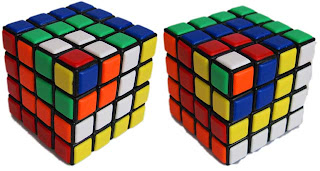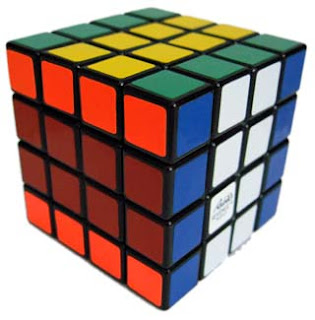
The Cube-in-Cube is one of the few patterns that can be adapted to all orders of puzzle cubes: Rubik's Cube, Rubik's Revenge, Meffert's Master Cube, Rubik's Wahn, et cetera.
In fact, there are a variety of options for the higher order cubes. Should the smaller cube be 2x2 or 3x3? Or even 4x4 (on the 5x5)? Take your pick.
I used Eastsheen cubes for the 2x2x2, 4x4x4, and 5x5x5 in the illustration and a Famwealth 3x3x3 that had a similar color scheme on the red-yellow-blue faces. The colors on the 3x3 don't quite match on the reverse side, as shown below.












